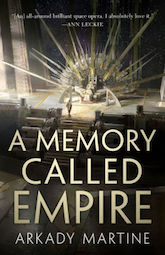A Memory Called Empire, the 2019 debut novel from Arkady Martine, is a current Nebula nominee, and it reminds me very strongly of Cherryh’s Foreigner by way of Ancillary Justice. A young woman named Mahit Dzmare is summoned from her home, Lsel Station, to the home planet of the Teixcalaanli Empire to be the new ambassador. Her people have a prosthetic memory device, called an imago-device, which is used to preserve knowledge over multiple generations, and the one from the current ambassador hasn’t been updated in fifteen years, because he hasn’t been able to leave Teixcalaan in that long. When Mahit gets there, she learns that her predecessor is dead, and she spends the next several months figuring out how and why. But first, she has to find someone to help her learn all the things her predecessor had learned and figured out since his last update, as well as improving her ability to speak Teixcalaanli. She’ll also have to do her best to not wind up dead along with him.
Martine has a keen understanding of the formal aspects of linguistics, like morphology and phonology, as well as sociocultural aspects of language. She has spent a lot of time studying various languages, and this shows in her linguistic worldbuilding.
She has developed a thorough phonetic system for Teixcalaanli as well as basic morphology. The name of the city where the empire is based is Teixcalaan; the adjectival form is Teixcalaanli; the people who live there are the Teixcalaanlitzlim. The phonology is reminiscent of Mesoamerican, bringing to mind Quetzalcoatl, axolotls, and Tlaloc. (The /tl/ cluster occurs frequently in Teixcalaanli.) Teixcalaanli phonology is different from Lsel’s. Lsel’s sounded vaguely Eastern European to me, with names like Yskander Aghavn and Mahit Dzmare, until I flipped to the back of the book and found the glossary and pronunciation key, which noted that it was most similar to Modern Eastern Armenian. Martine also provides IPA symbols for the sounds used in Teixcalaanli, which is vowel-heavy and low on consonants. The two languages look and sound different, and each of them follows its own set of rules. The name of the sector in space where Lsel is located, for example, is “Bardzravand,” which is pronounced “Parzrawantlak” in Teixcalaanli.
Buy the Book


A Memory Called Empire
Martine has also thoroughly developed naming conventions for Teixcalaan. Naming conventions are culture that is expressed through language. Teixcalaanlitzlim have two names: a number and a noun. When Mahit meets her cultural liaison Three Seagrass, she notes that plant names are usually flowers, so this is unusual and interesting. After telling a story about a man who gained citizenship and took the name Thirty-Six All-Terrain Tundra Vehicle, Three Seagrass says that “nice names are plants and flowers and natural phenomena. And not so many syllables.” The people of Lsel have two names, first and last, and Mahit doesn’t tell us the whys and wherefores of Lsel naming conventions.
The most subtle aspect of the novel’s linguistic worldbuilding is sociocultural. Mahit is a student of Teixcalaanli culture. She has studied their language since she was small, and she has spent hours reading histories and poetry and memorizing it all for the Imperial Exams. Her deepest desire as a teenager was to get a visa to study in the City and live there, immersed in the language and culture. When she arrives there, finally able to use the language she’s studied for decades, she comments on various aspects of the grammar itself: making sure to use the right politeness forms, making note of what politeness forms people used with her, noticing the use of a particularly archaic construction which she assumes is an idiom. (This is a real phenomenon, and I have citations about the persistence of archaisms in fixed phrases/idioms that I used in my thesis.) At one point, Mahit comments on a verb that Three Seagrass used to tell Nineteen Adze that she was in terror of her which is also used in poetry to mean “in awe.” If I didn’t already know that Martine had studied dead languages (and some living ones) extensively, this would have given me a big clue about her expertise…
Mahit comments on the ability of language to include and exclude, by the virtue of being able to use and recognize allusions and the right connotations. She expresses the sheer feeling of isolation one has when one is unable to communicate effectively with those around them, or to participate fully in their culture. When she thinks about a particular poet’s description of her home system, she remembers thinking, as a teenager, that she finally had words for how she felt, and they weren’t even in her own language. This doesn’t trip my “augh linguistic relativity” switch, because a) it’s the type of thing a teenager would think and b) poetry is better able to express a lot of things than prose, regardless of language. I’ve been known to find poetry better in German than in its English translation, so it makes sense that Mahit would have felt that way about this particular poetic description.
Have you read A Memory Called Empire? What did you think about the linguistic aspects (if you noticed them)? What about the book in general? This is one of the few books I read last summer that I didn’t choose specifically because of this column, but because I was interested in it the world and the story. Of course, I also expected there to be several things to comment on, because Martine was in my Viable Paradise class, and I have been in awe/terror of her intelligence for the last 6.5 years.
CD Covington has masters degrees in German and Linguistics, likes science fiction and roller derby, and misses having a cat. She is a graduate of Viable Paradise 17 and has published short stories in anthologies, most recently the story “Debridement” in Survivor, edited by Mary Anne Mohanraj and J.J. Pionke.











I took linguistics classes for my undergrad anthropology degree, so I notice when SFF authors take the time to develop their languages. A Memory Called Empire stood out as much as Cherryh’s work for being incredibly skilled at linguistics and cultural nuances.
I read it as an audiobook, so I didn’t get to see the glossary, but I remember the reader didn’t go for Nahuatl pronunciation but read it as it appeared, which I assume is what the glossary called for. I was rather disappointed by that, because while I get expecting readers to parse it as anything besides exactly as an American would pronounce those letters is a challenge, it’s sad that many people don’t know about the actual pronunciation of Nahuatl words at all. Hell, despite covering Mesoamerica in non-linguistics classes I didn’t know how axolotl or atl-atl was actually pronounced until years later. Aside from that small criticism, everything it did with language was amazing.
Singular is visum, a linguistics post should get that right (but my browser’s spell-checker doesn’t seem to know the singular, either).
The ring poem in LotR is a rare case where I like the German translation better than the English original (is Tolkien better at Germanic Old English than at modern English?) The original is Black Speech, anyway, maybe that was translated poorly to English. When I write something in English and then translate it into German it often sounds translated. Since Tolkien liked to write in his conlangs he might have the same problem with English translations of his poems.
@@@@@ 2: Visum is the singular form of visa –in Latin. In English, and in other languages as well, visa is the singular word. That’s a very odd hill to die on.
@1 Agreed. This is a book which I found needs to be read. Unfortunately the writing style is not suited to narration.
I enjoyed this book because, although the author took the pains with the language, it was did not get in the way of the storyline and culture. If, like me, the linguistics went over your head. It didn’t matter. The story and characters were strong enough on their own.
Well done Arkady.
Loved this book. It is beautiful, it pulls you in and soon all the language specific to the story seems “right”. One of those books that stays with you. Both Cherryh’s series and the Memory of Empire deal with our misunderstanding of language
Yes! Perfect description. I would love to see a more in-depth comparison of Mahit’s experiences vs Bren’s, and how both deal with navigating a very complex alien culture.
I really enjoyed the mentions of poetry and literature as well. That’s a really good way to deepen the worldbuilding for a culture. Having to know the references for the exam reminded me of classical China and their imperial service exams.
I should reread this. I’d seen Martine’s posts here about the Byzantine influences so I was well prepared for the intricacies of allusion and language. The way language and poetry conveys the weight of history in this book is impressive as well as the class and cultural divisions.
Though I’m starting to think we need some “released, I am a spear in the hands of the sun” vibes right now.
@birgit a linguist is not a prescriptivist and is aware of language as it is used and how it changes over time. That said, https://www.merriam-webster.com/dictionary/visa
@2/3/8: my 1944 OED says “visa” is the feminine, not the plural, to go with “carta”; this may be the source for Wikipedia’s definition.
Going back to the original topic: I thought the exact imitation of what we (think we?) know of Aztec was a bit over the top — especially since I recently reread one of de Bodard’s Aztec-fantasy murder mysteries, which portray the Aztecs much more grimly. (Or is that view now considered a result of conquistador bigotry?) But it’s interesting to read that there is a coherent base to the languages; even today, a lot of of authors seem to throw a batch of letters against a wall and write down what sticks. (I say “letters”, but let’s not forget the Dread Apostrophe.) At least the average practice seems better than I started reading SF mumble-mumble years ago.